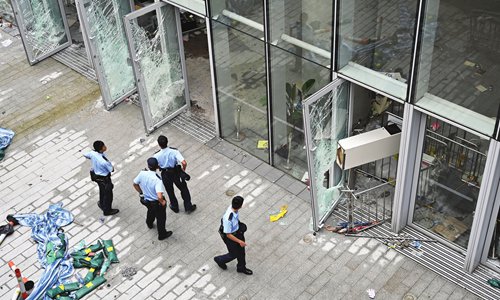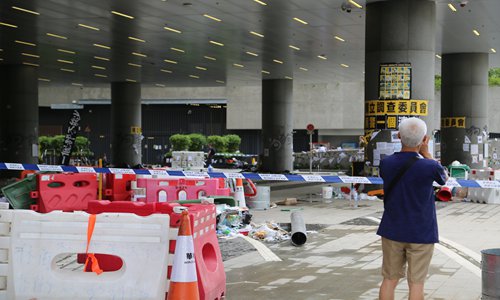HOME >> CHINA
Radical protesters trash Hong Kong’s rule-based system
By Yang Sheng and Chen Qingqing in Hong Kong Source:Global Times Published: 2019/7/2 23:38:40
Radical protesters trash SAR’s rule-based system

Police stand outside the Legislative Council building in Hong Kong on Tuesday, a day after protesters broke into the building. Hong Kong regional leader condemned "the extreme use of violence" by protesters. Photo: AFP
Saddened, shocked and regretful. This is how ordinary Hong Kong residents feel the day after radical protesters stormed the Legislative Council of Hong Kong (LegCo) on Monday, who made a huge mistake by trashing the rule-based legal system and ruining the long-term prosperity and stability of the city.
Broken glass were scattered everywhere at the entrance of LegCo, with graffiti on the building's wall. Protesters violently broke into the unicameral legislative body of the Hong Kong Special Administrative Region (HKSAR) and severely damaged not only government facilities but the image of HKSAR as a civilized society, which is also considered a global financial center and trading hub.
Dozens of public servants tried to clean up the area forcibly occupied by the protesters on Monday, removing protest signs on the streets and heaps of garbage. The legislative building has been closed to the public while some employees check remnants of windows for repair.
Western journalists gathered in front of the building, raising questions with Hong Kong people as to who should be blamed for the chaotic scene and how to address the anger and desperation of young protesters. Hong Kong residents who passed by the building said they were shocked and saddened by what had happened, and that there was no way to tolerate such violence and lawbreaking behavior.
"I feel sorry and sad seeing these violent scenes. What happened was out of control and young protesters are ruining their future," a local resident surnamed Chan, who is also a retired civil servant, told the Global Times on Tuesday.
Young people should always obey the law and conduct peaceful actions. Storming the legislative building and using extreme violence "has gone too far," and this is beyond a so-called peaceful protest, a local taxi driver surnamed Shum noted.
The whole world watched the shocking scenes on the day of the 22nd anniversary of the city's return to China. And such extreme violence has been widely condemned, which also broke the hearts of many ordinary people in Hong Kong.
Some Western journalists tried to imply that the LegCo building was severely damaged because the police failed to stop the protesters, and sent misleading information as tensions escalated between police and the public. In spite of the growing misunderstanding toward police, the Hong Kong police continued to safeguard major venues to ensure that social order in the city would gradually return to normalcy.
Mainland support
The Liaison Office of the Central People's Government in the HKSAR on Tuesday condemned the violent acts. The office also voiced its support for the HKSAR government in thoroughly investigating serious illegal activities.
The Ministry of Foreign Affairs also slammed the "double standards" of some Western countries, including the US, on the law enforcement of Hong Kong police, with its spokesperson Geng Shuang asking, "What would the police in the US and Europe do if the same thing happened in their countries?"
Many Chinese mainland people also criticized the West's double standards. Chinese internet users were outraged by the meddling of Western countries in the Hong Kong protest, which also muddled public opinion.
"They always prioritize democracy but they should be ashamed of their double standards and hypocrisy," a netizen said on Weibo, after some politicians in the West deliberately ignored the fact that Hong Kong protesters damaged public facilities and broke the law for their so-called rights and liberty, which hurt the fundamentals of a society ruled by law.

A local resident takes photos of the LegCo building in Hong Kong which radical protesters stormed into Monday night. Photo: Chen Qingqing/GT
Real public opinion
HKSAR Chief Executive Carrie Lam Cheng Yuet-ngor has been criticized by opposition groups, the protesters and some foreign media saying that she has failed to respond to public opinion and that she should resign.
Hung Kam-in, a member of the Kwun Tong District Council in Hong Kong, said that the chief executive is facing a dilemma between two different types of public opinion. When she announced a postponement to the amendment process of the extradition bill, she was responding to those who oppose the bill. But how about those who signed up in support of the bill and who hope the police would execute the law without tolerance on violent protesters?
So Cheung-wing, Chairman of the Hong Kong Island Federation, told the Global Times that before pushing the amendment, an organization received more than 930,000 signatures online in support of the amendment.
There is no denying that pushing the extradition bill is also a response to public opinion, So noted. "The extradition bill will 'plug holes' in the Hong Kong legal system, but opposition groups have misinterpreted the bill to misguide the people, and unfortunately, many people didn't read the bill carefully."
Two different views on the bill exist in Hong Kong, so opposition groups and foreign media cannot say there is only one voice on the matter, Hung said.
'Unreasonable' opposition
Anti-establishment activist Joshua Wong Chi-fung tried to enter LegCo on Tuesday but was rejected by the police. Wong supported the violent activists on his Twitter account, saying, "What kind of young people does Hong Kong produce? Smart, efficient, attentive and freedom-loving."
Confusing right from wrong and ignoring the rule-based system show that young radical protesters like Wong lack an understanding of China today. That's why they continue to find excuses for their irresponsible and unreasonable behavior, representatives from the Hong Kong political sphere said.
Many protesters and opposition groups launch unreasonable resistance to every policy decision made by the HKSAR government and China's central government, even policies that can help the city, So said.
Hung noted that some young Hong Kong people have been brainwashed and have no knowledge of the development of the Chinese mainland and the "one-country, two systems," and it is truly hard to influence them through normal communication because they refuse to believe anything that they disagree with.
Newspaper headline: Violence shocks Hong Kong
Posted in: POLITICS,HK/MACAO/TAIWAN